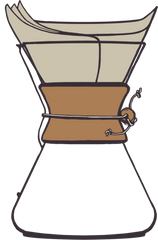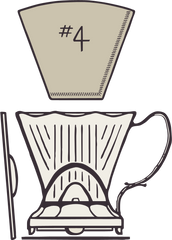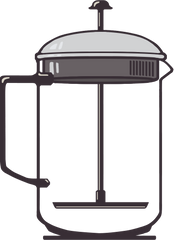Brewing Guides
Crafting the Perfect Cup
A few measurements and a little preperation is all you need to brew great coffee. To get started we need to know: 1: The ratio of coffee to water 2: water temp 3: coarseness of grind and 4: brewing or extraction time.
Chemex Brew Guide |
Clever Dripper Brew Guide |
French Press Brew Guide |
We recommend 7 grams of coffee to every 100 grams (4oz or ½ cup) of water. If you don’t have a gram scale, that’s about 2 tbsp coffee (14 grams) per each 8oz cup of water. Most pour-over units yield about 2 cups (16oz) of coffee. So we recommend about 30 grams of coffee to 500 grams (1 pint, 18oz or ½ a liter) of water.
For larger auto-drip machines just increase the numbers to compensate for additional cups. Try 60 grams coffee to 1,000 grams (36oz, 4 cups or 1 liter) of water.
Ideally you should rinse your filter paper, and preheat your brewing vessel and cups with hot water. Heat water to about 195 - 200° F. If you don't have a thermometer, just bring your water to a boil and let it sit for about 3 minutes before starting.
Keys to Successful Brewing
The grind should be neither too fine nor too coarse, and this is determined by the brewing method. Most pour-overs use about the same grind, medium/fine. French press and cold brew preparations are slightly coarser, medium/coarse. Espresso should be finely ground (just shy of pulverized dust). Turkish coffee is the only method that requires your grinder to be set to the finest possible setting: dust.
Brewing time should be accurately measured. Similar to grind, timing is determined by brewing method and is just as important as any other factor. Full-immersion style preparations (Clever Dripper/French Press) require 4:00 minutes of brew time, while pour-overs (Chemex/V60) can take anywhere from 2½ to 4 minutes.
Lucky for you if you've done something wrong you'll taste it. Over-extracted coffee, which tastes overly bitter or sour, results from either too fine of a grind, too long of a brew time, or water that is too hot. Under-extracted coffee might taste weak or watered down and is the result of using too coarse of a grind, too short of an extraction time, or tepid water. Striking the right balance takes practice but it's not rocket science.
Freshness & Storage
To avoid odor contamination and moisture damage, do not store coffee in either the refrigerator or freezer. Choose a location away from direct sunlight in a cool, dry place, sealed and away from moisture.
Our heat-sealed bags are designed to be the perfect store for fresh coffee. Each bag has a one-way CO2 release valve to de-gas from the roasting process. Inside the coffee is kept fresh and able to vent until your next order.




